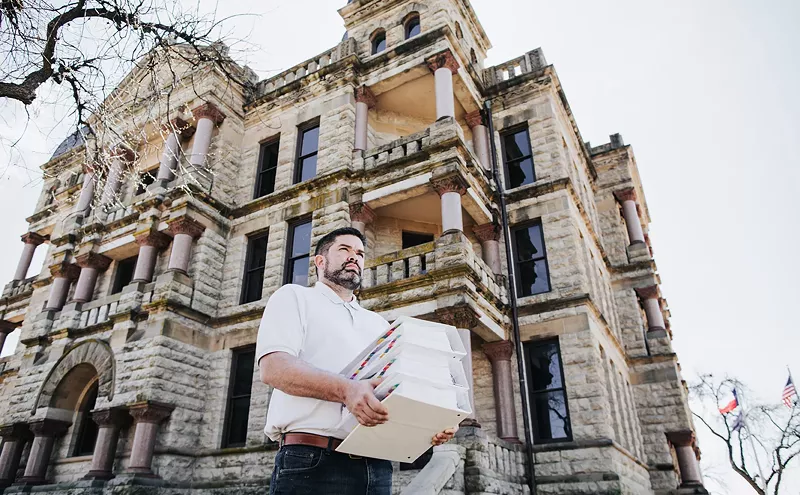The fight started on the third floor right before fifth period, when the kids were still buzzing from lunch and hardest to manage. Jennifer Duggins, a Spanish teacher, was monitoring the hallway outside her classroom when a surge of students rushed passed her and disappeared around the corner into an adjacent hall. She couldn't see what they were running to, but she didn't need to. Fights at Dade Middle School were commonplace. They had a peculiar gravitational pull that sucked in onlookers who happened to be within orbit, and were instantly recognizable.
This time, Duggins could sense that something was different. She could hear screams from around the corner and sounds of retching. Even as kids continued to run toward the unseen commotion, others were fleeing in the opposite direction. Convinced that something much more serious than the typical Dade brawl was taking place, Duggins began pulling kids into her classroom, whether they belonged there or not. She ducked in behind them when she caught a searing whiff of pepper spray that had wafted around the corner. She grabbed a blanket and did her best to seal the gap at the bottom of the door.
Duggins peered into the hallway through a window. Kids spilled from around the corner, coughing and rubbing their eyes from the pepper spray as they groped toward a nearby stairwell. Several paused to vomit. Duggins cracked the door and pulled in the students she could. Eventually the stream of pepper-spray victims slowed to a trickle, then stopped.
The campus stayed on lockdown for the next several hours as police and DISD officials pieced together what had happened. Some girls had gotten into a fight. When district police arrived to break it up, they met resistance as they attempted to wade into the crowd of several dozen onlookers. One of the officers shot pepper spray into the crowd. Parents, summoned by their kids' panicked phone calls and text messages, began gathering in front of the school, demanding to be allowed inside, followed closely by news crews.
Inside the locked-down classrooms, teachers and students were on edge. Duggins taught one lesson, then another. With the students growing restless and no indication that the lockdown was going to end, Duggins popped some popcorn and put on a movie on the condition that the film was at least tangentially related to Spanish class. The students voted for Nacho Libre.
The movie was well underway when a knock sounded on Duggins' door. On the other side of the door was Superintendent Mike Miles, who was surveying the incident's fallout. He took in the dimmed lights and flickering glow of the movie. "Excuse me, what are you doing here?" Duggins recalls him asking. He glanced down at his feet as he spoke to make sure his shoe hadn't landed in one of the puddles of vomit that dotted the hallway.
Duggins was stupefied. It was mid-May, and Dade had been in chaos since the beginning of the school year. It had just lost its third principal in 11 months. It was all teachers could do to maintain a semblance of order among their 11- to 14-year-old charges, particularly given the rudderless administration. One former Dade teacher remembers kids being sent to the office for threatening to assault or kill a teacher only to have them returned to the same classroom the next day. "Kids would come back and scoff at you and laugh," she recalls. And now here was Miles, who declined to comment for this story, striding through the aftermath of a near-riot and demanding to know why adrenaline-hyped tweeners who'd been locked in classrooms for hours weren't being taught. With difficulty, Duggins held her tongue.
At a faculty meeting later that afternoon, Miles told the teachers that, given the circumstances, he would overlook their deviation from their lesson plans. But he exhorted them to work even harder and to each do his or her part to turn Dade around. The speech received a chilly reception. Their jobs wouldn't be so hard, the feeling went, had Miles not screwed Dade up so badly in the first place.
Dade opened in August 2013 to a shower of praise from everyone from Dallas Mayor Mike Rawlings to neighborhood leaders. The $36 million campus is a gleaming gem set in an otherwise bleak landscape of vacant lots and joyless day-drinkers a half-mile from Fair Park. It resembles a suburban corporate campus as much as a public school, its hard institutional edges softened by the sand-colored brick and the layered, Kandinsky-esque glass panels that dominate the facade. The self-conscious motif — "Opportunity" — is stenciled in block letters along a main corridor. At the very least, it was a tremendous improvement over the two middle schools it replaced, Pearl C. Anderson and the old Dade Middle School, both of which were dilapidated and severely underpopulated.
Anyone trying to piece together what went wrong at Dade in the two years since it opened will, sooner rather than later, be directed to Alpha Thomas. At her suggestion, we meet in front of Dade, where she's at the front door talking shop with fellow Dade volunteers who are heading inside for a late-morning strategy meeting. She ushers me to the sidewalk along Al Lipscomb Way so we're not loitering on school property, just beyond the cover of a pair of spindly shade trees. Thomas seems oblivious to the sweltering late-summer sun and deafening clatter of commercial trucks lumbering to nearby Interstate 45. Every few minutes Thomas waves to acknowledge a passing driver's honk of recognition.
Short and moon-faced with dreadlocks — black at the tips, fully gray at their roots — hanging to her waist, Thomas wears her passion on her sleeve, which is loose and patterned with ancient West African symbols, and on her wrist and around her neck, which are laden with carefully picked jewelry: A turquoise medallion ringed by stylized animal prints calls back to her Choctaw ancestry; a necklace of black, green and yellow beads invokes the South Africa of her hero, Nelson Mandela. Only her brown loafers seem to be free of deeper meaning.
By temperament and training, Thomas, 57, is an activist. She has described herself as a "crazy, crazy, crazy lesbian," an LGBT activist who's loudly pushed for equality for decades. As a health educator in the late '80s and early '90s, she worked on the front lines of Dallas' AIDS epidemic. She's an equally outspoken advocate for her native South Dallas, particularly its youth. She cut her teeth as a champion of the neighborhood's schools under the mentorship of Kathlyn Joy Gilliam, a pioneering activist and the first black woman to serve on the Dallas school board. Thomas later navigated DISD as the parent of an adopted daughter.
Thomas became a staunch Miles opponent in the spring of 2013 when the superintendent moved to fire or demote 50 of the district's 223 principals, a list that included several popular South Dallas educators. While Miles was lobbying black pastors to support the plan as a necessary step toward boosting student achievement and closing the minority achievement gap, Thomas was protesting outside their churches. "Go Miles Away," read the sign she held at one protest.
Her involvement at Dade was, at the beginning at least, mostly nonpolitical. When the 2013-14 school year started, she was proud of the new campus and optimistic about its future. Not long after that, she started getting calls from her nephew, a seventh-grader. "He would call me almost every other day, crying, talking about his bullying experiences, so I just said, 'Let me go up to the school and let me see what's going on,'" Thomas recalls. The administration "nipped that particular situation in the bud, but the bullying continued throughout the school year with different students, so I was coming up and walking the halls and having lunch with my nephew and visiting classes and whatever."
"You'd see fights. You saw on the sixth-grade hall, they would cut the lights out and just start running down the hall."
tweet this
Thomas became a daily presence at Dade. Students remember her as one of the few bright spots. "She's a good person," says Courtney Stephenson, who encountered Thomas frequently as a sixth-grader last year. "She goes to Dade and volunteers and tries to help the kids and things like that." Tammy Pendill's daughter Karen spent sixth and seventh grades at Dade before transferring with Courtney to Oak Cliff's Greiner Exploratory Arts Academy for the current school year. "She cares about the kids," Pendill says of Thomas.
If nothing else, Thomas offered a welcome dose of stability. Dade ended the 2014-15 school year without a full-time principal, having churned through three in the previous two years. The school was also hemorrhaging teachers. Nearly half of those who started the 2013-14 school year at Dade had gone within 18 months, according to district records.
A common diagnosis for Dade's early troubles is that the mix of students from Pearl C. Anderson and the old Dade, schools that were bitter rivals, was too combustible to control. But those most familiar with the situation, including Thomas and Ed Turner, a community organizer with the Texas Organizing Project and head of Dade's site-based decision making committee, say the rivalry was made a non-issue by the law-and-order presence of faculty such as Steve Montgomery, a coach and community liaison whose mere presence was known to silence a rowdy cafeteria. "He was the glue that kept Dade together, because he knew all the children, he knows everybody here in the community. He knows these children's parents and their grandparents. He knows them and he taught them and he worked with them." He made sure they checked their rivalries at the door. "He'd just let them know straight up, that dog ain't gonna hunt," Thomas says.
The bigger issue, according to Turner, Thomas and several district observers and more than a half-dozen teachers who spoke with the Observer, was a leadership vacuum created by ineffectual campus administrators and fueled by a high concentration of inexperienced teachers.
The old Dade had been led for several years by David Welch, a veteran educator with strong ties to the South Dallas community. Welch, who declined to comment for this story, expected to become principal of the new campus as well, but the 2011-12 school year saw his campus' School Effectiveness Index, an in-house DISD measurement intended to capture how well students are being taught, drop sharply, from 53.1 to 46.4. After the school was knocked down from "met standard" to "improvement required," on state accountability ratings, Welch was included as part of Miles' principal purge. He ultimately accepted a demotion and later left the district. His replacement was Alecia Cobb, who was coming off a successful nine-year stint leading DeGolyer Elementary in Northwest Dallas. But Cobb had never been in charge of a middle school, much less one so thoroughly mired in poverty as Dade, where 92 percent of students qualified as economically disadvantaged, compared with DeGolyer's 52 percent. The faculty was even greener. According to state and district records, about 40 percent were first-year teachers.
The new Dade's inaugural year got off to a rocky start. Mass scheduling confusion caused classes to be filled to several times their normal capacity, teachers recall. Duggins, the Spanish teacher, remembers as many as 80 kids being packed into classes during the first days of school. Later, when teachers protested, the overflow was redirected to Dade's two gyms, where, according to a former instructional coach, the kids were "babysat" by assistant principals. The gyms were cleared and class sizes returned to manageable levels within a few weeks, but the bell schedule, which sets the electronic tones that signal the beginning and end of classes, remained in flux for weeks. The former instructional coach, who worked with teachers to improve teaching methods, estimates that the timing of the bells shifted a dozen times by October, bewildering students and teachers alike.
Kids soaked in the disorder. "You'd see fights. You saw on the sixth-grade hall, they would cut the lights out and just start running down the hall," another teacher recalls. "Kids yelling at teachers, principals. It's just chaos, basically, is what you see." Students ran roughshod over teachers, especially the new ones. According to the instructional coach, one first-year teacher was headbutted by a student but was too intimidated to report the incident. Only when one of his parents arrived at school to wonder why he hadn't been punished was there any discipline.
Thomas had to counsel one novice teacher who had broken down sobbing in front of her class. "You've gotta hold back them tears," Thomas exhorted. "If you're going to cry, you've got to do that in private or whatever, because you keep on shedding those tears, sister, they're going to keep pushing those buttons." Thomas adds, with a rueful laugh, "She wasn't the only one that cried."
Not just the neophytes struggled with discipline. One teacher, who characterizes her time during the new Dade's inaugural year as the worst experience by far she's had in more than a decade of teaching at high-poverty middle schools, says students routinely threatened her with physical harm. Cobb, the principal, wasn't immune to derision, the teacher says. As she walked the halls one holiday, students brazenly pelted her with candy.
Neither Cobb nor her immediate successor, Michael Jones, consented to an interview, but the pair released a joint statement through a DISD spokesman acknowledging "some stumbles academically and culturally that impeded success occurring at the rate we would have liked" but defending their overall record.
"There were successes during our tenure, and we did operate a school that positively impacted the lives of many children," they said. "We disagree with any assertion that the school was chaotic or lacked discipline. Such a description would be unfair to those who worked hard, and it ignores that there were far more good days than bad at Dade. A few stumbles do not solely define a person or a school."
Bill Betzen, a former middle school teacher and staunch anti-Miles activist, toured the campus a few weeks after it opened. "Most of the clocks in the building were already destroyed. The principal basically said the kids jump up and stick their fists in the face of the clock, and they think it's funny." In the bathrooms were broken stalls and shattered mirrors. "Just pure vandalism," Betzen says.
The turmoil was reflected in end-of-year statistics. Test scores had dropped. The year before the two schools merged, overall passing rates on the state's STAAR reading test had been 57.9 percent at the old Dade and 61.6 percent at Pearl C. Anderson. At the new Dade, the figure had dropped to 52.3 percent. Scores on STAAR tests for writing, math, social studies and science saw similar declines. Behavior problems were also up. Disciplinary actions at the new Dade for fighting were up by 86 percent over the previous year's totals at old Dade and Pearl C. Anderson. Assaults were up 60 percent. Reports of vandalism jumped almost fourfold. The year had been a disaster.
His teachers called him Big Sensitive. "I don't know why!" swears 12-year-old Eddie Simmons. Eddie, husky and excitable, is sitting in the living room of his family's tidy two-story home, a week-and-a-half before the start of his seventh-grade year and, hopefully, a spot on the Dade Vikings football team. The words spill out of him in excited bursts, like they can't quite keep pace with his thoughts. "We had a party in [one] class. Mr. Wall walked in, like, 'What's up Big Sensitive?' I was like, 'Don't call me that please,' and so he was like 'Man, stop being so sensitive.'" Even now, after almost an entire summer, the injustice of it still astounds him. "That was his number one rule! You can't say no put-downs!" For adults who might not be familiar with his curious turn of phrase, Eddie offers a definition. "'Put-downs mean like [when you] score on somebody."
Eddie's father works offshore and is on an oil rig somewhere in the Gulf of Mexico. His mother, Natasha Holloway, a part-time hair stylist and tax preparer, sits next to him in the living room. Eddie speaks in rambling monologue, jumping breathlessly from anecdote to anecdote, abandoning topics in mid-stream. Holloway redirects his wilder tangents but otherwise lets him talk. "I wish you could have met him last year versus now," she says when he leaves the room, shaking her head in exasperation. "You can identify that his conversation is so ... 'What are you talking about?' It's all over the place."
Eddie attended elementary school at Charles Rice Learning Center, generally regarded by parents as South Dallas' best. The transition to Dade last year was tough. His kept his grades up, but intellectually and emotionally he seemed to regress. "They're not lying when they call him Big Sensitive," his mother says.
Cobb had been replaced as principal by Michael Jones, who had spent several years as an assistant principal at various DISD high schools and middle schools. Eddie remembers him, if only vaguely — "That's the man, right?" — because Miles abruptly reassigned Jones, two assistant principals and 10 teachers to other campuses following an unannounced visit six weeks into the 2014-15 school year.
"The quality of instruction in too many classrooms at Dade was poor," Miles explained in a statement following the shakeup. "The expectations around teachers teaching and students learning were too low. I understand that schools cannot change overnight, but I have an obligation to adjust what we are doing to ensure that our students receive the best education possible. The situation is urgent and our students cannot wait until the end of the year for changes to be made."
Dade's first-year troubles had largely escaped the attention of the public and school board, but Miles' October bloodletting visit changed that. Board President Eric Cowan says trustees wondered whether Miles had given Jones a fair shake. He'd been appointed well into the summer, Cowan says, leaving him little time to prepare for the year. Giving him just six weeks to prove himself hardly seemed fair. "People were raising valid questions about whether that was the time to make that switch," Cowan says. "Now, Dade was on everybody's radar."
Miles removed Jones on October 10, a Friday. The blowback arrived early the following Monday in the form of DISD trustee Bernadette Nutall.
Nutall was a one-time Miles supporter, joining seven of her eight colleagues in voting to hire him in April 2012. Her opinion of Miles, a former Army Ranger and forceful advocate for data-driven school reform, soured over the next year as, she says, she realized "he had no vision for the district." By the time Miles unveiled his plan to replace dozens of principals, among them Welch and popular Madison High School leader Marian Willard, Nutall had established herself as Miles' chief nemesis on the school board.
That Monday, Miles had scheduled a predawn meeting with Dade teachers to discuss the leadership change. Nutall says she showed up because she was concerned about the direction of the school, not to force a showdown with Miles. "I did not know it was a Mike Miles meeting."
The showdown happened regardless. When he learned that Nutall was on campus, Miles, apparently viewing her presence as an attempt to undermine his leadership, stepped into the school's main office and phoned DISD police Chief Craig Miller, according to an incident report. With Miller on the line, Miles passed his cell phone to Assistant Chief Gary Hodges, who had been leaving the campus when he'd been summoned back into the building by Miles' driver, Freddie Jackson. Miller relayed to Hodges that Miles wanted Nutall removed from the school. Hodges radioed for two officers to join him at Dade. When Sergeant Russell Rojas and officer Jose Rodriguez arrived and asked Nutall to leave, she objected, claiming she had the right as an elected official to be present at the school. She lingered for several minutes after being told that refusal to leave constituted trespassing. "Finally, after refusing to leave and backing away from officers, she was escorted to the front door by Sgt. Rojas and Officer Rodriguez," the incident report says. Surveillance footage shows the officers grabbing Nutall by the arms and pulling her outside. Miles watches from the lobby.
"I would say that Dade was probably the sixth nail in his coffin."
tweet this
Miles narrowly kept his job. Cowan says the board seriously considered firing him but ultimately issued a reprimand. For Nutall's constituents in South Dallas, the incident confirmed their previous impression that Miles was a bully who was wrecking their schools. "I'm just going to be honest with you, sir, I feel like Mr. Miles threw a tantrum," Thomas says.
Jones was replaced as principal by Margarita Garcia, who was reassigned from Hogg Elementary. Garcia failed to bring order to Dade during her brief tenure, students and teachers say. She lasted until April, when health issues led her to resign.
Following Jones' dismissal, Eddie Simmons noticed a steady erosion of order. He could see it in the uniforms. Kids would "start coming in with no badges, they were like 'I ain't got no badge.' They'd start coming in with black pants 'I can't find any khaki pants' ... Then they start coming with any kind of shirt, any kind of pants. Then they start coming in with these sandals, like jellies or something like that, and those weren't appropriate for school."
Eddie describes Garcia as "almost a principal, but she wasn't there a lot." When she was, she didn't command much respect. Eddie recalls an assembly shortly after the administration took away potato chips as punishment for widespread misbehavior when Garcia was drowned out by a raucous chant: "GIVE US CHIPS! GIVE US CHIPS!" When the chanting died down, Garcia announced, "I was gonna let y'all get it next week, but never mind."
The lunchroom was even more chaotic. Food fights were frequent, several of them the all-out food wars that often occur in movies but seem too hyperbolic for real life. Once, Eddie says, a student flung an open milk carton at an assistant principal's head. Courtney, his fellow sixth-grader, remembers it differently. The milk carton hit a teacher, not an assistant principal, and it wasn't thrown so much as poured on his head; the assistant principal had been hit by some other food item. Karen, the seventh-grader, says they weren't the first grown-ups caught in a food fight. "Dr. Cobb, our first principal, got hit in the head with an apple," she recalls. "She's like, 'Whoever I see throwing anything on the [cafeteria's surveillance] cameras, y'all are getting suspended or expelled!"
Teachers confirm that food fights were frequent and massive last year, but DISD spokesman Andre Riley says Karen's story isn't true. "Under Dr. Cobb's tenure, there was a food fight during the first couple of weeks of school involving sixth-graders," Riley says. "I'm told the fight was quickly stopped and the students throwing food had to clean the cafeteria. No students were suspended."
As a result of the food fights, the school was placed on what Eddie calls "lunch arrest." Rather than going to the cafeteria, students were served unappetizing cold sandwiches in their classrooms. Courtney's mother arranged to bring Courtney and Karen Lunchables, which they considered a significant upgrade.
Class offered little respite from the chaos. Eddie's sister Zy'riah Simmons, an eighth-grader last year, says she lost her math and science teachers in October "because — what's his name? — Mike Miles fired all our teachers and ... no teachers wanted to come substitute." (The science teacher actually went on maternity leave, sources say, and didn't return). Zy'riah did "basically nothing" in those classes until mid-February, when permanent replacements were hired. According to her mother, Zy'riah failed the science portion of the STAAR test and barely passed in math.
A teacher who arrived at Dade in the middle of the 2014-15 school year says it was like walking into a scene from Lord of the Flies. The problems that had plagued Dade during its inaugural year — rudderless leadership, inconsistent discipline, overwhelmed teachers — continued to fester. The adults in the school may as well not have been there. Karen and Courtney say it was routine to have teachers cry in class. One of Karen's teachers would "cry almost every period, yelling [unintelligibly], then she'd walk outside the classroom, come to Ms. Irving and be like 'Can you watch my kids and your kids because I just can't handle it.'" Courtney says one of her teachers left Dade after "this girl called her a racist three-oh-four." ("The h-word," Courtney explains. "Just write 304 the numbers" and turn them upside down.) To middle schoolers, the suffering of teachers plays as high comedy.
Like her predecessors, the teacher who arrived last January felt abandoned by the administration. Kids "just had this insane sense of entitlement," she says. Students believed they could threaten her and one another with impunity. "I didn't feel safe," she says. "Other kids didn't feel safe."
When Alpha Thomas arrived at Dade early on the afternoon of May 11, the campus was teeming with DISD police officers. "Oh my God, what's going on?" she muttered to herself. In the office, Thomas encountered one of the students from an after-school girls' leadership academy she runs, tears streaming down her cheeks. "Baby, what's wrong?" Thomas asked her. The girl said she'd been pepper-sprayed.
"She did not get pepper-sprayed," Thomas says. "I've been pepper-sprayed, brother, and I know how that feels." It's like a "zillion jalapeño pepper juices being squeezed on you." She didn't doubt the girl's discomfort, but feels that her blame was misdirected. "A lot of those people that got pepper spray in their eyes, they should have had their butts in class."
Thomas knows the officer who used pepper spray and thinks it was probably justified. But she doesn't think the officer would have been in the situation had there been some consistency in leadership — if Welch had been kept on from the old Dade, or if Cobb had been given another year as principal, or if Jones had been given more than six weeks to turn things around. When Miles organized a meeting with parents to discuss the pepper-spray incident, Thomas attended with seven girls from her leadership academy in tow. They sat in the second row. "Look," she told them. "I want y'all close, and I want you to look him in the eyes.' And I went over with them how to ask a question without shaking your head or having an attitude or all that, because the students had some very serious feelings toward Mr. Miles." In the meeting, Thomas said a silent prayer. "God, get this person up out of here. This man is a detriment to this school district. He don't know what he's doing and it's just really sad. Our babies are just being bamboozled."
Miles announced his resignation the following month, not solely because of the chaos at Dade. "I would say that Dade was probably the sixth nail in his coffin," Cowan, the DISD board president, says. Cowan, along with trustee Dan Micciche, were viewed as the swing votes on the board. Both had been generally supportive of Miles' initiatives, but they weren't in the tank for him like Miguel Solis and Mike Morath; neither were they bent on running him out of town, like Nutall and Joyce Foreman.
The prevailing narrative holds that Miles lost Cowan's support when he fired the principal of Rosemont Elementary, where Cowan's daughter goes to school. But Cowan says that's not true. "My skepticism for his ability to lead long-term for this district really started around the Dade issue," he says. Dade was where Miles' shortcomings as a leader — his prickly ego, his tin ear for politics and community relations, his hamfisted personnel decisions — were laid bare. "He's a visionary, but you have to execute that vision," Cowan says. Miles proved he couldn't.
Even so, Miles wasn't going to be fired. According to Cowan, he still enjoyed the support of a majority of board members. The election of Edwin Flores in May added another pro-Miles voice to the board. In June, however, Cowan says Miles approached a handful of trustees and asked for his contract to be amended to reiterate that individual trustees had to adhere to the board operating procedure, which they already had to do, and that they wouldn't search for a replacement while he remained with the district. Cowan and the others balked. "What appears maybe on paper to be fairly simple requests was just incredibly bad timing and arrogant, in my opinion," Cowan says. Miles announced his resignation soon after it became clear his contract wouldn't be amended.
"We've laid a good foundation," he said. He just couldn't stick around to build upon it.
tweet this
At a press conference and in a farewell video to DISD employees, Miles put a positive spin on his departure, touting a rigorous regime of principal evaluations and the Teacher Excellence Initiative, one of the most comprehensive pay-for-performance plans in the country, as key victories. "We've laid a good foundation," he said. He just couldn't stick around to build upon it. "I have been here for three years, two of them without my family. I think it's time to return to Colorado."
Sunlight streams through enormous picture windows as principal Tracie Washington, wearing a trim, black-and-white plaid jacket and restrained hoop earrings, strides across Dade Middle School's library to a small meeting room. Inside, one of her assistant principals is presiding over the school year's inaugural Coffee with the Principal, which has attracted about a dozen parents. Washington apologizes that other duties forced her to miss much of the meeting, but the parents seem pleased with even a belated opportunity to heap praise upon the school's new leader in person.
Rosie Lazo, whose family moved to Dallas not long before school started, says her sixth-grade daughter Diana has loved Dade. "I have never seen her so excited in all these years that she's been in school as this year. It's awesome." Leonard Hatcher says the school's transformation from last year has been evident from his perch across the street at Oasis Baptist Church, which he pastors. "It makes me wanna re-enroll in school," he says with a laugh.
Their optimism is easy enough to understand. Dade appears to be a well-functioning middle school. Disciplinary incidents are down, attendance up. Peering into classrooms, one finds students engaged and teachers in command. And Washington is a buoyant leader. She has a commanding presence, at once forceful and kind, and tackles her work with evident passion. "I do believe it's my God-ordained purpose for living," she says. Washington previously spent two years leading Seagoville Middle School, where she helped raise test scores, boosted staff morale and helped elevate the campus from the bottom tier of DISD middle schools.
The irony is that Miles bears at least as much responsibility for Dade's nascent turnaround as he does for the chaos that preceded it. Last spring, his administration named Dade one of seven ACE campuses as part of a targeted intervention aimed at rapidly turning around struggling schools. The ACE program, like its predecessor at Dade, Imagine 2020, seeks to boost student achievement through an extended school day, extra tutoring and pay incentives to attract high-quality teachers.
But ACE is less about adding resources to a campus than reconstituting it from the ground up. Dade employees who wanted to remain on campus, from teachers down to custodians, were required to reapply for their jobs. Only about 15 percent were back to begin the school year. The rest were replaced by veteran teachers from around the district, many of whom were lured by the $10,000-per-year bonus offered to those rated "distinguished-eligible" under the new teacher evaluation system.
Students and parents who wanted to continue attending Dade were required to sign a contract pledging to show up on time and in uniform and do 90 minutes of homework per day. Those who didn't would be sent to Hood Middle School, about five miles away. Jolee Healey, executive director overseeing the seven ACE schools, says a small handful of kids transferred to Hood but that no student was refused enrollment at Dade for refusing to sign the contract.
Washington, too, is a product of Miles' system. She was one of the inaugural graduates of the principal-training academy Miles set up early in his tenure.
Nutall sees signs of a turnaround, though she's reluctant to credit Miles. "Miles left," she says. "He put 'em in place, but I think the folks there are going to be responsible" for success at Dade. And even if success materializes, it won't undo the past. "My heart goes out to the students," Nutall says. "We played with one year of their sixth-grade, seventh-grade, eighth-grade life.












